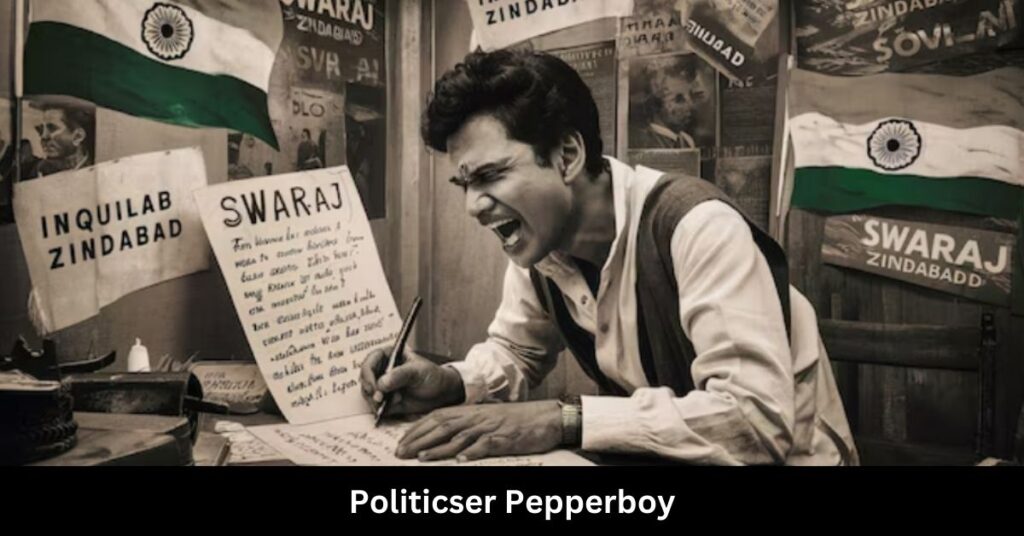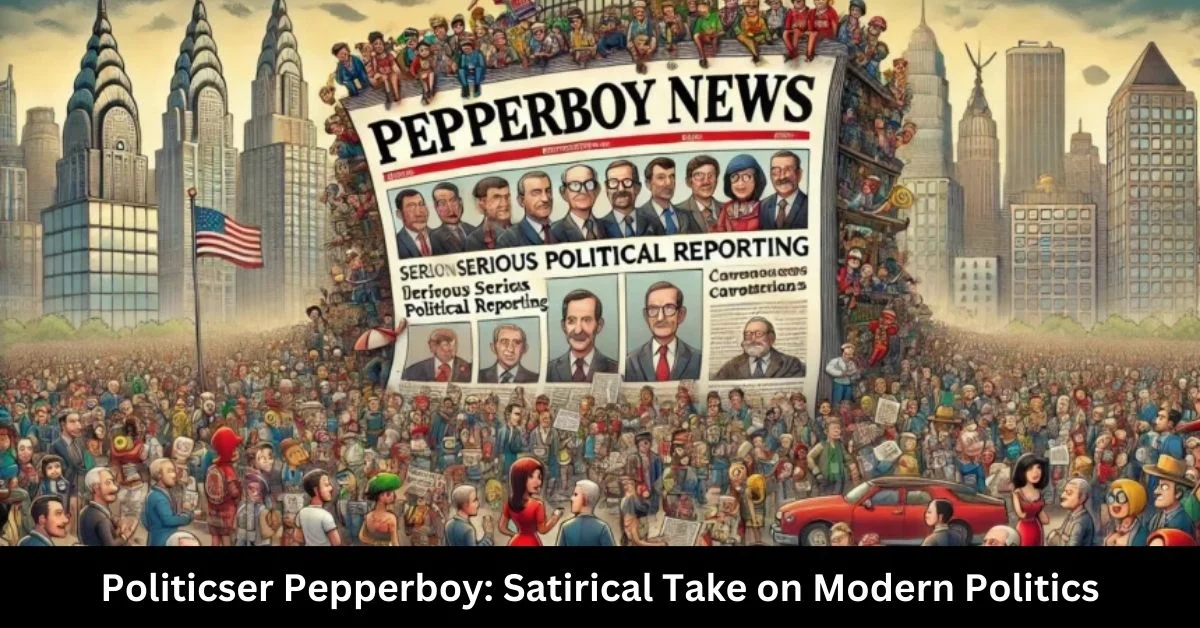Politics has long been an arena where ideas clash, ideals crumble, and power struggles emerge. While it can be a serious domain of public service, legislation, and governance, there’s no denying that political satire has played an important role in making these complex matters accessible and entertaining for the masses. Enter Politicser Pepperboy, a fictional character who serves as a humorous reflection of today’s political figures, movements, and issues. Through satire, Pepperboy brings to light the absurdity, contradictions, and hypocrisy that often permeate the political landscape.
This article will delve into the concept of Politicser Pepperboy, examining its satirical roots, relevance in modern society, and how humour can be an effective tool for exposing uncomfortable truths. We’ll also explore how this character captures the absurdities of contemporary politics and engages audiences who might otherwise disengage from political discourse.
The Origins of Political Satire
Satire has been around for centuries, dating back to ancient Greece and Rome, where writers like Aristophanes and Juvenal used humour to criticise societal issues, political leaders, and cultural norms. It was a way for the powerless to hold the powerful accountable, using humour as a weapon that could cut through rhetoric and propaganda. Politicians and institutions may change over time, but satire has remained a constant as a means of expressing dissent and making complex political issues more relatable.
In the modern era, shows like Saturday Night Live, The Daily Show, and Last Week Tonight have become household names for their humorous takes on political issues. These programs and their hosts use satire to address serious topics like corruption, inequality, and international relations, but with a comedic edge that draws people in. This environment provided fertile ground for the emergence of characters like Politicser Pepperboy.
Who is Politicser Pepperboy?

Politicser Pepperboy is a satirical, exaggerated political figure who embodies the inconsistencies, contradictions, and sometimes outright ridiculousness of modern-day politics. Whether it’s politicians flip-flopping on key issues, the widespread use of populist rhetoric, or the growing distance between the public and their elected officials, Politicser Pepperboy encapsulates all these frustrations and channels them into a character that both entertains and critiques.
In many ways, Politicser Pepperboy is not a singular character but rather a composite of various political archetypes. He could be the career politician who changes their stance based on public opinion polls, or the populist leader who makes grandiose promises but rarely delivers. With his exaggerated mannerisms and a penchant for using slogans without substance, Pepperboy is a mirror of the most extreme elements of modern political discourse.
The Persona of Pepperboy
The character of Politicser Pepperboy is crafted to be simultaneously familiar and absurd. He’s the politician we’ve all seen before: all bluster, soundbites, and sweeping gestures, but with little in the way of genuine policy or conviction. One moment, Pepperboy is calling for radical change, and the next, he’s maintaining the status quo. His campaign slogans are catchy but vague, making promises that sound good but hold no water when scrutinized.
For example, Pepperboy might shout: “Let’s bring pepper to every table—because a spicy life is a free life!” The metaphor here is thinly veiled, meant to evoke the sort of hollow political rhetoric used to drum up support without providing any real substance. The pepper, like many campaign promises, becomes a stand-in for whatever issue is trending at the moment. It’s a playful yet biting commentary on how often politicians use broad, feel-good language to gain favour without diving into the nitty-gritty of policy.
The Visuals of Politicser Pepperboy
Satirical characters often have distinct visuals that contribute to their impact. Politicser Pepperboy’s appearance would be no different. Imagine a caricature-like figure with oversized glasses, a gaudy suit, and a comically large pepper shaker that he carries with him at all times. His exaggerated features, such as a too-wide grin and exaggerated hand gestures, make him both funny and unsettling.
The pepper shaker is symbolic representing his so-called “solutions” to every problem. Whether it’s foreign policy, healthcare, or environmental issues, Politicser Pepperboy always has the same answer: “Just add pepper!” This humorous approach highlights the one-size-fits-all solutions that politicians sometimes propose, solutions that often fail to address the complexities of real-world problems.
The Role of Satire in Today’s Political Climate
In an era of 24/7 news cycles, social media soundbites, and increasingly polarised public discourse, political satire offers a way to cut through the noise. Figures like Politicser Pepperboy may seem outlandish, but they are rooted in a reality that many people recognize. Through humour, satire provides a mechanism to critique and question the motives of those in power without falling into pure cynicism or despair.
The character’s ridiculousness serves a deeper purpose: it holds a funhouse mirror up to the absurdity of modern politics. In a world where politicians often seem more focused on their media appearances and branding than on policy, Politicser Pepperboy’s exaggerated persona feels all too familiar.
Bridging the Gap Between Engagement and Apathy
One of the biggest challenges in modern politics is engaging a public that increasingly feels disillusioned or disconnected from the political process. Voter turnout is often low, and many people express frustration at the lack of meaningful choices or change. Characters like Politicser Pepperboy can serve as a gateway to re-engage people with politics, albeit through a non-traditional lens.
Satire, in this way, becomes a tool for civic engagement. By making politics humorous and approachable, it invites people back into the conversation. Even if they are initially drawn in by the humour, audiences may stick around long enough to grasp the deeper critiques embedded within the satire. For some, laughing at Politicser Pepperboy’s antics might be the first step toward becoming more informed and involved citizens.
Also Read: SMMCompare: Social Media Management Tools
Politicser Pepperboy and Populism

One of the major elements that Politicser Pepperboy satirises is the rise of populism in global politics. Populist leaders often employ simplistic language and frame their ideas in a way that pits “the people” against “the elite.” In doing so, they present themselves as the only solution to a broken system. Politicser Pepperboy takes this narrative to the extreme.
Pepperboy’s speeches are full of populist rhetoric. He claims to speak for the “common man” while simultaneously doing very little to challenge the structures of power that maintain inequality. His solution to every problem—adding pepper—becomes a metaphor for the oversimplified, performative solutions that populists often offer. It’s easy to say that you’re fighting for the people, but much harder to enact meaningful change. Pepperboy, like many populist leaders, thrives on spectacle rather than substance.
The Hollow Nature of Political Promises
Through his grandiose but empty promises, Politicser Pepperboy also critiques the tendency of modern politicians to overpromise and underdeliver. Whether it’s promises of rapid economic growth, dramatic tax cuts, or instant healthcare reform, many political campaigns are built on platforms that are either impossible to achieve or woefully inadequate in their execution.
Pepperboy’s constant promise to “pepper every meal” may seem absurd, but it’s an apt metaphor for the kind of promises politicians make when they lack concrete plans or the willingness to grapple with complex issues. His simplistic solutions are a satirical representation of how political figures often rely on charisma and slogans to cover up the fact that they don’t have a workable solution to the problems they’re addressing.
The Power of Satire in Social Commentary
While satire often makes us laugh, it’s also a powerful tool for social commentary. By distorting reality, satire highlights truths that might otherwise go unnoticed or unspoken. Politicser Pepperboy, in his absurdity, offers a sharp critique of the political systems and actors who prioritise style over substance, performance over policy.
Humour as a Lens for Critical Thinking
One of the key functions of satire is that it invites audiences to think critically, even as they laugh. Politicser Pepperboy’s over-the-top persona forces viewers to question the real-world politicians and systems he is parodying. Are their solutions as shallow and performative as Pepperboy’s? Are they more interested in gaining favor than in solving real problems? By posing these questions, satire encourages a deeper engagement with political issues.
In an era where misinformation and sensationalism are rampant, satire serves as an antidote to blind acceptance. It teaches audiences to question what they’re being told, to look beyond the surface, and to recognize the often ridiculous contradictions inherent in political rhetoric.
Also Read: Antarvwsna Techniques: Mindfulness, Solitude, and Reflection
The Influence of Satirical Characters in Shaping Public Opinion
Satirical characters like Politicser Pepperboy have a unique power to shape public opinion. While they may be fictional, they often leave a lasting impact on how audiences perceive real-world politicians and political movements. The humour makes the critiques more accessible, especially to younger audiences who might be less inclined to watch traditional news coverage or engage with dry political commentary.
In some cases, these satirical characters can even influence elections or political discourse by calling attention to the absurdity of certain policies or candidates. For example, in the United States, characters like Stephen Colbert’s conservative persona and Saturday Night Live’s portrayal of political figures have, at times, had measurable impacts on public perceptions of real politicians.
The Double-Edged Sword of Satire
However, satire can also be a double-edged sword. While it draws attention to political issues, it can also contribute to cynicism and disengagement if audiences feel that the issues being critiqued are beyond repair. Some critics argue that satire, by focusing so much on the flaws and hypocrisies of the political system, can foster a sense of hopelessness.
In the case of Politicser Pepperboy, the risk is that audiences might laugh at his antics without taking the time to reflect on the real-world problems he is satirising. The challenge for satirists is to strike a balance between humour and critique, ensuring that their work not only entertains but also inspires critical thought and, ideally, action.
The Future of Political Satire
As long as politics remains a part of human society, satire will continue to thrive. Characters like Politicser Pepperboy represent a new wave of political satire that adapts to the realities of our media-saturated world. With the rise of social media, memes, and viral content, satirical characters can reach wider audiences than ever before, often becoming symbols of resistance or dissent.
In an age where political figures are increasingly treated as celebrities and where soundbites often hold more sway than substance, the role of satire is more important than ever. Politicser Pepperboy, with his exaggerated persona and simplistic solutions, offers a humorous but biting reminder of the importance of critical thinking, civic engagement, and the need for accountability in politics.
Conclusion
At first glance, Politicser Pepperboy might seem like nothing more than a comedic character, but his absurdity serves a deeper purpose. Through satire, Pepperboy reflects the contradictions, shallow promises, and performative nature of contemporary politics. He holds up a mirror to the political establishment, challenging us to laugh at its flaws while also encouraging us to think critically about the real-world implications of those flaws.
Ultimately, the enduring appeal of characters like Politicser Pepperboy lies in their ability to make political issues accessible while also encouraging deeper reflection. As long as there are politicians making hollow promises, there will be satirists like Pepperboy to hold them accountable—one peppery punchline at a time.
Read More: Cassasse: Historical and Linguistic Insights






